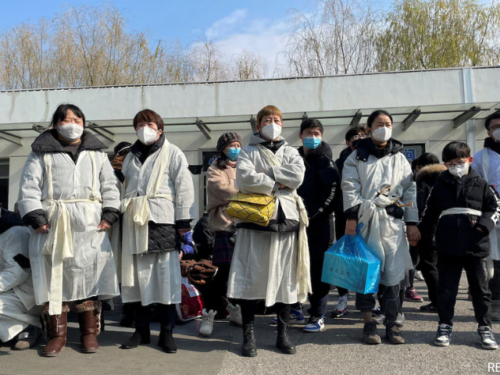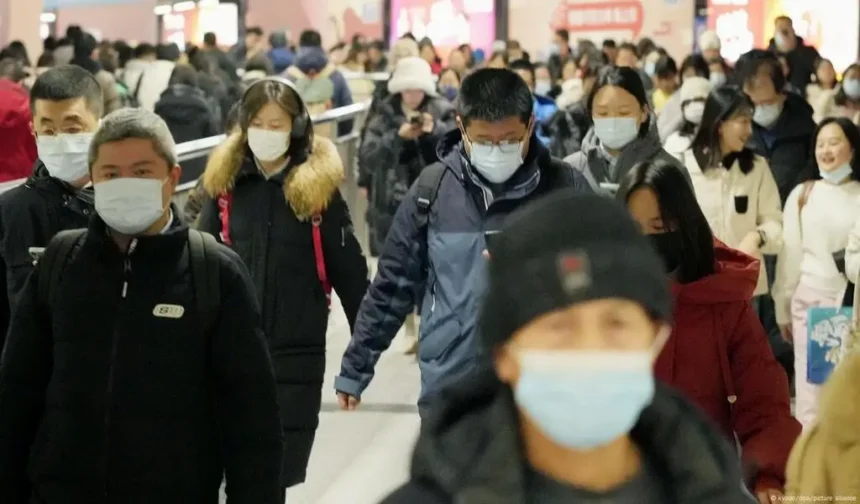This winter, respiratory infections are on the rise in China. A lesser-known virus has attracted considerable attention, leading some people to worry that the surge in cases might affect the world.
Data released by the Chinese Centres for Disease Control and Prevention last week show that the number of cases in the country has recently increased. Human metapneumovirus, or HMPV, can cause upper and lower respiratory disease in individuals of all ages.
However, HMPV is typically transmitted in the Northern Hemisphere during winter, and CDC data from China indicate that the prevalence of several other common respiratory infections, such as the seasonal flu and respiratory syncytial virus (RSV), has increased.
“The levels of respiratory infections reported in China are within the normal range.” In a news briefing on Tuesday, Margaret Harris, a spokesperson for the World Health Organisation, stated, “It is consistent with the winter season.”
To allay apprehensions, she stated that hospital utilisation in China is lower than last year and that no emergency declarations or emergency responses have been initiated in the country in response to these respiratory infections.
Harris emphasised, “Human metapneumovirus is not new; it was first identified in 2001.” This virus has been circulating in the human population for a long time and is often spread during winter and spring.
The CDC in the United States monitors the transmission of HMPV in the same manner as it does other respiratory viruses. It is estimated that HMPV is responsible for approximately 10% to 12% of respiratory ailments in children. Most individuals will contract HMPV before age 5, and subsequent reinfections may occur throughout their lives.
The data shows that the number of HMPV cases started rising in November and has continued increasing. Nonetheless, the weekly percentage of respiratory infections testing positive for HMPV remained low at 1.94% as of December 28, especially compared to other widespread viruses. That same week, influenza stood at 18.71%, while COVID-19 was at 7.10%.

This is the season for respiratory viruses for a reason. Janet Hamilton, executive director of the Council of State and Territorial Epidemiologists, stated, “We have become accustomed to considering those that have been particularly severe, such as Covid, flu, and RSV. However, there are a variety of other respiratory viruses that can cause illness.”
Hamilton stated that while recovering independently from prevalent respiratory infections, such as HMPV, is possible, this is not always the case.
“Infections are generally considered to be relatively benign, and they are frequently compared to the common cold,” she continued. “Human metapneumovirus is one of the viruses that are frequently associated with the common cold, although many individuals are unaware that it is the cause of their common cold.”
Symptoms of HMPV and How It Compares to Other Respiratory Viruses
Cough, fever, congested nose, and shortness of breath are among the symptoms that are frequently linked to HMPV infections.
HMPV spreads similarly to some other respiratory viruses. Transmission occurs via droplets released during coughing or sneezing and through physical interactions, such as handshakes or touching contaminated surfaces.
“Implementing simple precautions can help reduce the spread,” Harris noted. “If you’re feeling unwell or displaying symptoms, please stay at home.”
Additionally, when you are aware that a virus is currently in circulation and is in crowded or inadequately ventilated areas, you may wish to consider wearing a mask. She advised, “Increase ventilation whenever feasible.” “And, of course, use a tissue to cover coughs and sneezes.”
Harris stated that certain individuals are at an elevated risk of developing severe infections from HMPV.
“In certain instances, much like any of the common cold viruses, it can result in a more severe illness in individuals who lack immunity or have extremely weak immune systems,” she stated.
“That is the very young.” This applies to newborn infants, so visiting and embracing them while they suffer from a cold is not advisable.
Additionally, it pertains to the elderly. Once more, this is the reason why you should refrain from visiting your great-grandmother, who is over 90 years old, at the hospital while you are ill.
How to Manage Mild HMPV Infections: Treatment and Recovery Advice
Healthcare providers can perform HMPV testing, but currently, there is no vaccine or specific antiviral treatment for infections. It’s important to stay hydrated, rest at home, and consider certain over-the-counter medications to relieve symptoms.
Mild cases of HMPV generally persist for several days up to a week, with most individuals recovering independently within two to five days.
In a statement released on Monday by the Science Media Centre based in the UK, John Tregoning, a vaccine immunology professor at Imperial College London, noted that the condition will appear similarly to flu, SARS-CoV-2, and RSV.
Those impacted should follow the same advice: rest, hydrate, and refrain from spreading the virus to others.
“If you are feeling extremely unwell, please consult your general practitioner,” he advised. “Antibiotics will be ineffective against it due to its viral nature.”














